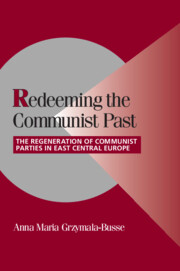Book contents
- Frontmatter
- Contents
- List of Tables
- List of Acronyms
- Acknowledgments
- INTRODUCTION: SURVIVING DEMOCRACY
- 1 THE ROOTS OF REGENERATION: COMMUNIST PRACTICES AND ELITE RESOURCES
- 2 BREAKING WITH THE PAST, REORGANIZING FOR THE FUTURE
- 3 DEVELOPING PROGRAMMATIC RESPONSIVENESS
- 4 CONVINCING THE VOTERS: CAMPAIGNS AND ELECTIONS
- 5 PARLIAMENTARY EFFECTIVENESS AND COALITIONS
- CONCLUSION: SUCCEEDING IN DEMOCRACY
- APPENDIX A THE CONTENT ANALYSIS OF PROGRAMS
- APPENDIX B THE QUANTITATIVE ANALYSIS OF ELECTORATES
- APPENDIX C THE STRUCTURES OF COMPETITION
- Bibliography
- Index
- Titles in the series
INTRODUCTION: SURVIVING DEMOCRACY
Published online by Cambridge University Press: 04 December 2009
- Frontmatter
- Contents
- List of Tables
- List of Acronyms
- Acknowledgments
- INTRODUCTION: SURVIVING DEMOCRACY
- 1 THE ROOTS OF REGENERATION: COMMUNIST PRACTICES AND ELITE RESOURCES
- 2 BREAKING WITH THE PAST, REORGANIZING FOR THE FUTURE
- 3 DEVELOPING PROGRAMMATIC RESPONSIVENESS
- 4 CONVINCING THE VOTERS: CAMPAIGNS AND ELECTIONS
- 5 PARLIAMENTARY EFFECTIVENESS AND COALITIONS
- CONCLUSION: SUCCEEDING IN DEMOCRACY
- APPENDIX A THE CONTENT ANALYSIS OF PROGRAMS
- APPENDIX B THE QUANTITATIVE ANALYSIS OF ELECTORATES
- APPENDIX C THE STRUCTURES OF COMPETITION
- Bibliography
- Index
- Titles in the series
Summary
Men make their own history, but they do not make it just as they please; they do not make it under circumstances chosen by themselves, but under circumstances directly encountered, given, and transmitted from the past.
We cannot continue as we have. A radical transformation of the party is not a tactical concession, but a question of political survival.
This book addresses a fundamental question in the study of democratic politics and institutional change: How can the discredited political actors of an ancien regime not only survive the collapse of the old order, but succeed in the new one? Among the most spectacular cases of such persistence and adaptation are the survival and regeneration of the communist successor parties in East Central Europe, the focus of this book.
As communist regimes collapsed across East Central Europe in 1989, the defeat of the communist parties seemed complete. After all, these were the same regimes that had shown no regard for basic civic rights, had “strategically planned” the economies into negative growth rates, and had displayed a remarkable propensity for corruption and self-enrichment. Over forty years of oppression had left the people with memories that were as bitter as they were vivid, and the popular uprisings of 1989 fought to remove the parties from power. The first demand voiced by the masses of demonstrators in the streets, and by their representatives negotiating with party officials, was that the communist stranglehold on the economy and the polity finally end. The democratic breakthroughs of 1989 thus bade farewell to regimes widely despised by their own citizens.
- Type
- Chapter
- Information
- Redeeming the Communist PastThe Regeneration of Communist Parties in East Central Europe, pp. 1 - 18Publisher: Cambridge University PressPrint publication year: 2002



